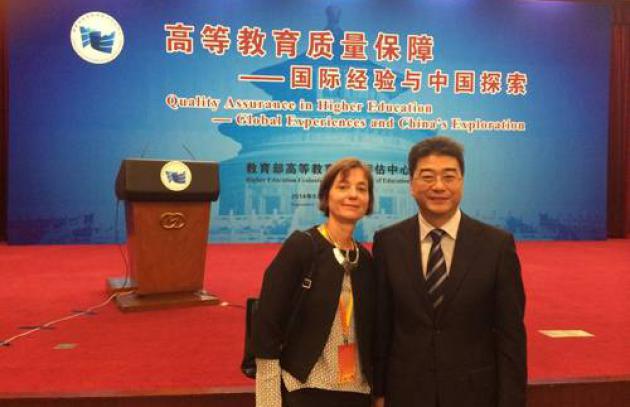qainchina.jpg

IIEP has presented a keynote speech at the International Forum on “Quality Assurance in Higher Education: Global Experiences and China’s Exploration”, organized by the Ministry of Education’s Higher Education Evaluation Centre, in Beijing
IIEP Programme Specialist Ms Michaela Martin was invited by the Chinese Higher Education Evaluation Centre (HEEC) to present a keynote speech on “Options and International Trends in Quality Assurance: Do they respond to the challenges of higher education systems?” at the International Forum organized by HEEC on the occasion of their 10th Anniversary. The HEEC Forum on “Quality Assurance in Higher Education: Global Experiences and China’s Exploration”, held on 23 September, drew more than 200 high-level officials from the Chinese higher education (HE) sector. Attendees included university presidents, vice-presidents, and academics in charge of internal quality assurance (IQA) systems, as well as several international experts from Australia, Hong Kong, Japan, Republic of Korea, Russia, and the OECD.
The invitation followed a request from the HEEC to translate IIEP-UNESCO’s Modules on External Quality Assurance: Options for higher education managers into Chinese. The translated modules have been successfully used by the Centre to support training delivered to the Chinese quality assurance (QA) community, with a view to harmonizing QA practices across a rather fragmented system. HEEC is the founder of the Chinese Association for Quality Assurance Agencies in Higher Education, which has 14 external QA agencies and more than 200 internal QA units as members.
“Quality assurance in higher education in China is a priority of the policy agenda within a fast-changing HE sector”, said HE Vice-Minister of Education, Du Yubo, at the Forum. Today, China has the largest higher education system in the world, with 2013 enrolments reaching nearly 35 million, and approximately one out of five international students of Chinese nationality. According to UNESCO, the GER in China has grown from only 1% in 1980 to 26% in 2010.
Within a context of major systems expansion, the Chinese Government has made the quality of academic training one of its priorities. Since the late 1980s, the Ministry of Education (MoE) has developed HE evaluation in a number of ways, linked in part with its policy of selectively allocating research funding to strong universities (under the 985 and 211 Programmes).
The HEEC was created in August 2004 by the MoE, with the objective of institutionalizing evaluation and moving towards a regular, systematic, and professional approach. “The HEEC developed the ‘Five in One’ Evaluation, a comprehensive system of evaluation of newly created HEIs and programme evaluation and accreditation in engineering education”, said Professor WU Yan, the Centre’s Director General. It is very eager to develop strong international relations with QA agencies and to benchmark its system against international experiences.
During the International Forum, a meeting for the external experts in attendance was organized with the Vice Minister of Education H.E. Du Yubo, who was assured of IIEP’s continuing support to the capacity development of QA in higher education. Discussions were also held on possible areas of collaboration, such as the association of Chinese universities in the newly launched IIEP international research project on quality assurance at the high education institution level.
“Developing and streamlining the capacity of universities to manage their internal systems should be one of the new priorities for HE policy in China”, said Michaela Martin. “And IIEP is willing to support these processes.”





